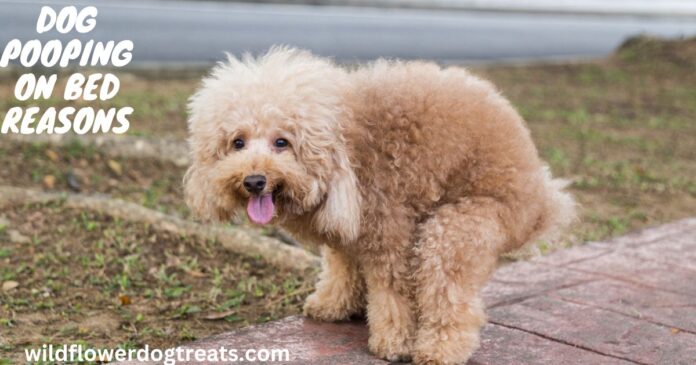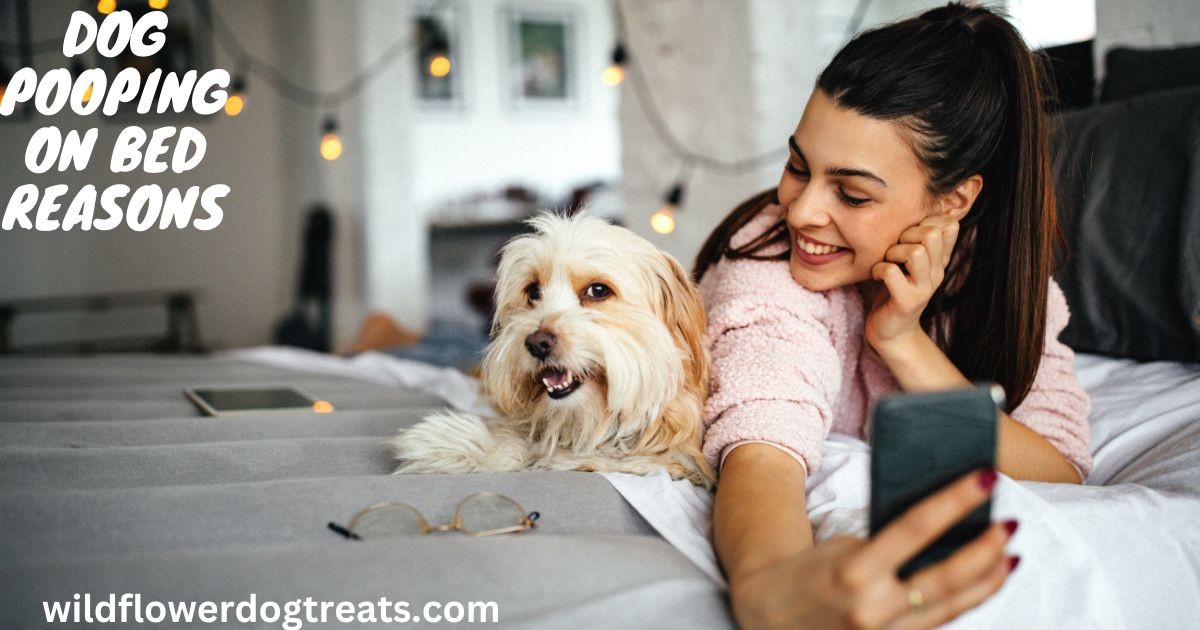Your dog may be pooping on your bed due to stress, anxiety, or a medical issue. Dog Pooping on Bed Reasons. It might also be a sign of marking territory.
Understanding the specific reason behind this behavior will help address the problem effectively. If you’re puzzled by your dog’s unexpected behavior of pooping on your bed, you’re not alone. It can be a frustrating and confusing situation. However, there are various reasons why your dog might be displaying this behavior.
We’ll explore the potential causes behind this behavior, offer insights on how to address it, and provide tips for preventing it from happening in the future. Dog Pooping on Bed Reasons. By understanding the underlying reasons for this behavior, you can take the necessary steps to help your furry friend and maintain a clean and harmonious living space.
Understanding The Behavior
It’s common for dogs to display inappropriate bathroom behavior, including pooping on their owner’s bed. This could be due to anxiety, a medical issue, or lack of proper training. Understanding your dog’s behavior and addressing the underlying cause is crucial in resolving this issue. Dog Pooping on Bed Reasons.
Understanding the Behavior Dogs are generally clean animals and prefer to eliminate in specific areas. However, if your dog is pooping on your bed, it’s essential to understand the behavior behind this unusual action.
Canine Bathroom Habits
Dogs have specific bathroom habits which are influenced by their instincts and well-established territories. They typically prefer to eliminate in areas away from their resting and eating areas.
General Physiology
Understanding a dog’s physiology can provide insights into their bathroom habits. Their digestive system and bowel movements are closely linked to their overall health and stress levels.
Behavioral Triggers
Various factors can trigger unusual toileting behavior in dogs. This can include changes in their routine, environment, or medical issues.
Anxious Elimination
Anxious elimination occurs when a dog feels stressed or anxious and is unable to control their bathroom habits. This can lead to them pooping in unexpected places, such as your bed.
Stress As A Factor
Stress can be a major factor in a dog’s toileting behavior. Changes in the household, such as new family members or pets, loud noises, or being left alone for extended periods, can create stress for your dog.
Signs Of Anxiety In Dogs
Watching for signs of anxiety in your dog, such as excessive panting, pacing, or hiding, can provide insights into their emotional state and potential triggers for their unusual toileting behavior. Understanding the underlying causes behind your dog’s behavior can help in addressing the issue effectively and promoting their overall well-being.
Addressing Medical Causes
Dogs pooping on their owner’s bed can be a common yet concerning behavior. While behavioral issues are often the primary cause, it’s important to consider potential medical reasons for this unwanted behavior. Addressing medical causes is crucial in understanding why a dog may be pooping on the bed and finding a solution to the problem.
Potential Health Issues
When a dog starts pooping on the bed, it could be a sign of an underlying medical issue. Various health problems, such as digestive issues, dietary factors, or signs of illness, could contribute to this behavior.
Digestive Problems
Digestive problems like gastrointestinal infections, inflammation, or parasites can cause a dog to have accidents, including pooping on the owner’s bed. Since these issues can be uncomfortable, a dog may seek out a familiar, soft surface like a bed for relief.
Dietary Factors
A dog’s diet plays a crucial role in their digestive health. Inappropriate feeding or food sensitivities can lead to gastrointestinal upset or diarrhea, which may result in accidents on the bed.
Symptoms Of Illness
Accidents on the bed can also indicate a more serious health problem. Keep an eye out for other symptoms of illness, such as changes in appetite, lethargy, or vomiting, which may accompany the inappropriate elimination behavior.
Signs Of Discomfort
If a dog appears to be uncomfortable, restless, or in pain before pooping on the bed, it could be a sign that there’s an underlying medical issue causing the behavior. Dogs may seek out the bed for comfort when experiencing discomfort.
Seeking Veterinary Consultation
If a dog continues to poop on the bed, it’s crucial to seek veterinary consultation. A professional can conduct a thorough examination to rule out any underlying health issues and provide appropriate treatment or management options.
Creating A Comfortable Environment
Dogs are sensitive creatures that thrive in a comfortable and secure environment. When it comes to the unsettling behavior of a dog pooping on the bed, creating a comfortable space for your canine companion is vital. This can help address underlying causes and prevent such incidents from reoccurring. Consider the following aspects to ensure your furry friend feels at ease and content within your home.
Correct Litter Box Placement
Ensuring the litter box is strategically placed can influence a dog’s behavior significantly. Placing the litter box in a quiet and accessible location can prevent accidents on the bed. In addition, keeping the litter box clean and odor-free is essential for your dog’s comfort and to discourage unwanted behavior.
Location Considerations
When choosing a location for your dog’s bed, consider a quiet and peaceful area away from high traffic or noise. This will provide a relaxing environment for your dog and reduce stress or anxiety, which can lead to accidents on the bed.
Types Of Beds Preferred By Dogs
Dogs have preferences when it comes to bedding. Understanding your dog’s preferences for soft, firm, or elevated beds can help in providing a comfortable space that your dog will be less likely to soil.
Behavioral Training Techniques
Implementing behavioral training techniques can help address the underlying causes of your dog’s behavior. This can include positive reinforcement methods and consistency in training to encourage desired behavior and discourage soiling the bed.
Positive Reinforcement Methods
Using positive reinforcement, such as treats or praise, can encourage your dog to use the designated bathroom area and avoid using the bed. Consistently rewarding desired behavior is crucial in shaping your dog’s habits.
Identifying Environmental Stressors
Identifying environmental stressors that may be causing your dog to poop on your bed is crucial for addressing the issue effectively. By understanding the potential triggers, you can take steps to alleviate your dog’s stress and create a more harmonious living environment.
Changes In Routine
Changes in routine can significantly impact a dog’s behavior. For example, altering your dog’s feeding or walking schedule may cause stress, leading to undesirable behaviors such as pooping on the bed.
Impact Of Schedule Alterations
Impact of schedule alterations can disrupt your dog’s sense of predictability and security. This can lead to anxiety and behavioral issues, including inappropriate elimination. Consistency and stability in your dog’s daily routine are vital in preventing environmental stress.
Separation Anxiety
Separation anxiety is a common cause of distress in dogs, often resulting in disruptive behaviors when left alone. Your dog’s anxiety may manifest as pooping on your bed as a coping mechanism for their distress.
Household Dynamics
Household dynamics play a crucial role in your dog’s well-being. Changes in the household, such as arguments or tension among family members, can create a stressful environment for your dog, potentially leading to inappropriate elimination behaviors.
New Family Members
New family members can disrupt the established dynamics within your home, impacting your dog’s sense of security. This change may result in stress-induced actions, including pooping on the bed.
Conflict Resolution Techniques
Implementing effective conflict resolution techniques within the household can help alleviate stress for your dog. Creating a peaceful and harmonious environment can contribute to your dog feeling more secure and less likely to exhibit distress-related behaviors.
Maintaining Hygiene And Cleanliness
When a dog starts pooping on your bed, it can be frustrating and unhygienic. Maintaining cleanliness and hygiene is crucial for preventing such behavior from reoccurring. By implementing proper bedding maintenance, regular cleaning procedures, the use of odor neutralizers, preventive measures, and effective supervision strategies, it’s possible to manage accidents appropriately and create a clean environment for your pet.
Bedding Maintenance
Keeping your dog’s bedding clean is essential in preventing accidents on your bed. Washing the bedding regularly, using pet-friendly detergents, and ensuring it’s thoroughly dried can discourage your dog from soiling it.
Regular Cleaning Procedures
Implement a regular cleaning schedule for your pet’s living area. Promptly clean any accidents, and use pet-safe cleaners to fully sanitize the affected spot.
Use Of Odor Neutralizers
Utilize odor neutralizers to eliminate any lingering scent that may attract your dog to repeat the behavior.
Preventive Measures
Consider potty training or behavioral training to prevent future accidents.
Supervision Strategies
Implement effective supervision strategies, including crate training or limiting access to certain areas of the house until your dog’s behavior improves.
Managing Accidents Appropriately
When accidents occur, it’s crucial to manage them appropriately by cleaning thoroughly, avoiding punishment, and redirecting your dog’s behavior to the appropriate potty area.
Reinforcing Positive Behaviors
Discovering why your dog is pooping on your bed can be frustrating, but reinforcing positive behaviors can help. Training and positive reinforcement techniques can be used to encourage your dog to eliminate in appropriate areas, such as through crate training, regular potty breaks, and rewards for desired behaviors.
Encouraging Proper Elimination
To discourage your dog from pooping on your bed, it’s essential to encourage proper elimination behaviors. Reward your dog with treats and praise immediately after they have successfully eliminated in the designated outdoor area or on a pee pad.
Outdoor Potty Breaks
Regular outdoor potty breaks are crucial for preventing accidents in the house. Take your dog outside frequently, especially after meals, naps, and playtime. This habit will significantly reduce the likelihood of your dog pooping on your bed.
Scheduled Bathroom Trips
Establish a consistent schedule for bathroom trips. Set specific times for your dog to go outside to eliminate. This routine helps your dog understand when and where they should potty, minimizing accidents indoors.
Establishing Trust And Security
Creating a safe and secure environment for your dog is essential for reinforcing positive behaviors. Instill trust by using positive reinforcement techniques and providing a comfortable living space that includes a designated potty area.
Building A Strong Bond
Strengthen the bond with your dog through regular positive interactions. Spend quality time with them, engage in bonding activities, and demonstrate patience and understanding. A strong bond will encourage your dog to follow your guidance and rules.
Calm And Reassuring Environment
Maintain a calm and reassuring environment to prevent stress-related potty accidents. Avoid scolding or punishing your dog for accidents and instead, focus on creating a positive and relaxed atmosphere that promotes healthy elimination behaviors.
Frequently Asked Questions On Why Is My Dog Pooping On My Bed
Why Is My Dog Pooping On My Bed?
Dogs may poop on the bed due to stress, anxiety, health issues, or lack of proper training. It’s crucial to observe their behavior, ensure they’re in good health, and provide appropriate training and attention.
How Can I Prevent My Dog From Pooping On My Bed?
To prevent this behavior, establish a regular potty routine, offer positive reinforcement, address any anxiety triggers, and create a comfortable and designated sleeping area for your dog.
What Health Issues Could Cause My Dog To Poop On The Bed?
Health issues such as gastrointestinal problems, urinary tract infections, and anal gland issues can contribute to inappropriate elimination. Consult with a veterinarian if you suspect underlying health issues.
Is It Normal For Dogs To Poop On The Bed?
Inappropriate elimination can be a sign of distress or medical concerns. While accidents can occur, it’s important to address this behavior promptly through training, observation, and potential medical evaluation.
Conclusion
Understanding why your dog is pooping on your bed is crucial for addressing the issue. By considering factors such as stress, anxiety, or health issues, you can take appropriate steps to prevent this behavior. Consulting with a veterinarian and implementing positive reinforcement can help in retraining your dog’s behavior.
Remember, patience and consistency are key in resolving this issue.





Thank you for your sharing. I am worried that I lack creative ideas. It is your article that makes me full of hope. Thank you. But, I have a question, can you help me? https://accounts.binance.com/zh-TC/register-person?ref=VDVEQ78S
Can you be more specific about the content of your article? After reading it, I still have some doubts. Hope you can help me.
Your article helped me a lot, is there any more related content? Thanks!